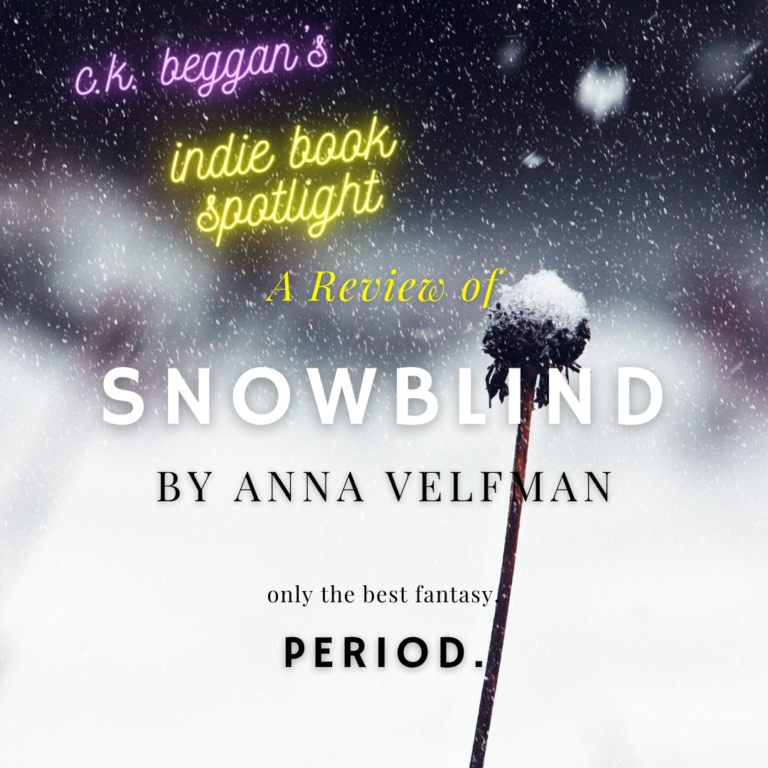At long last! A fantasy about a character with chronic illness, whose affliction isn’t treated like something to be overcome and isn’t there to inspire anyone.
Lanna is a Southerner, born in a cold, harsh land full of rules. She also suffers from seizures. In a place where survival is anything but a guarantee, she’ll never be considered a full adult. It’s one of many reasons we first meet Lanna and her equally tough-as-nails family on the road to the more plentiful Empire.
Look at an Amazon preview (I’m not affiliated), and you’ll instantly know that Snowblind is exquisitely written. The details and descriptions are never rushed but don’t hinder the story flow, either. Those careful descriptions create an immersive world I felt I could walk around in.
In fact, Velfman does twice the world-building by creating two very different settings. The outer village Lanna first resides in, falls in love in (also perfectly rendered; she makes him work for it), and the Imperial capital (the hall that houses the concubines is its own world, with its own flower language) are like characters themselves. And all the characters in Snowblind are well-developed.
Lanna is a sort of goldilocks female MC. She has a heart, and it is available to her suitor, if he can earn it. But she also can give an ox a run for its money with her work ethic and strength. She is practical, savvy, and never silly, even in the thrall of a romantic storyline with Pride and Prejudice qualities (though, thanks to Lanna’s culture, it’s not as restrictive or chaste).
Unfortunately, Snowblind did need more copy-editing. There are more typos than in W.R. Gingell’s Spindle (also loved and reviewed here), but it does surpass those issues and continue to be an amazing, well-written story. There is also a chapter or two that made me squeamish, in which a slave sings the praises of the Empire’s supposedly benevolent form of slavery to Lanna, who is horrified. I would have preferred it be called something else, since it isn’t slavery at all. She is told slaves can leave whenever they like.
All that is a part of a this is the Empire and what you learned in the South is totally backwards theme, but it was too close to real-life revisionist history for me. It’s thankfully brief. Lanna also curses a gay character who drugs her by calling him a pervert and corrupter of men, though before and (eventually) after this they are friends. These are very small episodes in the book, but as I am recommending Snowblind I wanted to share this for full disclosure.
Another remarkable thing about this book is how well the tension and intrigue was layered (the complex characters play no small part in this). Lanna is ripped from everything and everyone she knows and loves, and has no choice in the matter. We always know what’s in her heart. The people who surround her are sometimes kind, sometimes not, and there are always hints at a deeper agenda.
A lovely, Pride and Prejudice-esque romance, Machiavellian characters, great world-building, court intrigue and a fine representation of the chronically ill: a lot of good things are packed into this debut fantasy.
An antagonist in the capital is the only character with overt goals, and she tries to thwart, disgrace and generally ruin Lanna without qualm. But the others aren’t so easily pinned. In Snowblind, the real “villains” are more ambiguous, and a heck of a lot better at concealing it. These are no mustache-twirling bad guys tying maidens to a railroad track. They might manipulate the maiden, though, or toss her aside if she gets in the way of their true aim. They’re a lot more Machiavelli than, say, Voldemort.
Amidst all this is the repeated interruption of Lanna’s seizures, the thing that has always kept her from the life she wants. The powerlessness of chronic illness is captured so well and so sensitively that I could’ve cried. “All her life there had been a wall,” the book says of Lanna. “Her sickness had been a barrier to so much. Angry at her own mind for being defective she clutched her head, and something in her snapped…Then the tears came: hot, regretful and bitter.”
As people who (possibly) mean well make her illness worse, as it changes and complicates her life and keeps her from her simplest, most essential needs (love, family, productivity and the ability to choose where she will go), this book spoke to me. This is the kind of representation I’ve been waiting for. I hoped it would be what it looked like in Snowblind’s description, and I wasn’t disappointed.
Flaws and all, this is a wonderfully written book, and I very much look forward to snatching up the rest of Lanna’s story.
Want to know when the next review will be out?

